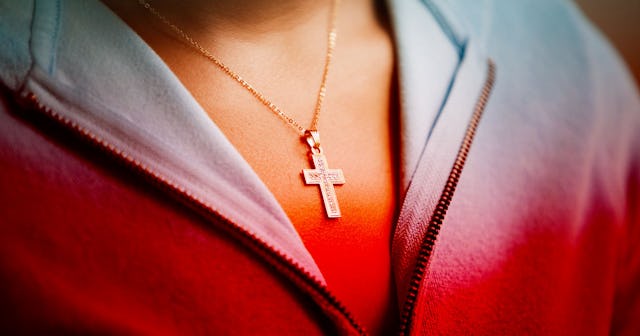I'm Finally Recognizing All The Ways My Religious Upbringing Has Traumatized Me

7:28 am on Sunday morning.
I was up countless times last night with my 11-month-old, soothing him back to sleep, and once with my special-needs-almost four-year-old. My reward? An ocular migraine and some major mom guilt. Now, before you start telling me to sleep-train, save your breath—I’m not interested.
At 6 am, my loving husband took the baby downstairs so I could get some more rest. I hear no signs that any one is in distress downstairs. I even smell the pancakes he lovingly cooked everyone for breakfast. It would be so easy to roll over and fall back asleep—so easy to allow my tired eyes to seal shut—but because of my years of conditioning, I don’t.
Instead, I stumble downstairs and am met with a caring, “You’re supposed to still be sleeping!” from my husband.
“I felt guilty for sleeping longer.”
And then I paused, allowing myself to consider my actions and think—why did I feel SO guilty?
The answer came in an effortless flash, once I allowed myself to ponder: religious trauma.
From the time I was a little girl, I was fed conservative religious ideas for breakfast, lunch, dinner, and the occasional snack. An extremist, evangelical feast where seconds were always encouraged. I bought into those ideas for the majority of my life until recently, after joining those (mostly, fellow millennials) leaving the church in droves. Now, I have begun to recognize all the subtle and not so subtle ways my religious trauma impacts me.
Panic attacks, flashbacks, hypervigilance, and a sense of overwhelming dread are some of the hallmarks of religious trauma that I regularly experience. Religious holidays like Christmas and Easter are often met with a racing heart, stomach ache, and a tearful meltdown to my husband once the “celebration” is over. But religious trauma isn’t always flashy like that. It’s sinister in its subtlety and its ability to pervade even the smallest thoughts, feelings, and behaviors.
So let me tell you about why I blame religious trauma for not being able to sleep in.
P Deliss/Getty
One of the recurrent themes in my childhood home was to be productive, helpful, and always serving others to the point of martyrdom. The trope of the suffering servant was revered and considered a personal calling for everyone, ESPECIALLY women and girls. This looked like anticipating everyone’s physical and emotional needs, wearing makeup even when you were going to spend the day at home so you’d be pleasing to the eyes of others, revering motherhood as the peak calling of women, working hard to stay in shape for men’s pleasure BUT making sure not to be too tempting, so as not to make them sin. The list of unrealistic and toxic expectations went on and on.
Unsurprisingly, this list also included not sleeping in, as sleeping in was considered slothful and lazy. After all, how can you serve others if you’re sleeping? And who can forget the Proverbs 31 woman who always woke up before dawn to get sh*t done for her family? If you sleep in, you aren’t fulfilling your chief role as “servant.”
And so, somewhere deep in my bones, part of me still automatically thinks that to be a good person, a good mother, a good wife, and good woman, and to prove my worth to my family and the world, I have to get out of bed early on a Sunday morning. Even though NO ONE needed me to and I was still exhausted. Even though I was encouraged by my partner to get more sleep. Even though my throbbing eyes were begging me to rest. Even though I was up countless times the night before, parenting my children.
The myriad symptoms of religious trauma show up like a demon around every corner, waiting to attack. My therapist has the crucial task of helping me (also a therapist) process those weekly. However religious trauma shows up in your life, you are beyond worthy of the time, money, and energy to pursue recovery. Leaving religion has been the gift that keeps on giving, despite the pain and heartache of the fallout. I am finding new ways to practice self-care instead of running myself into the ground in the motherhood/martyrdom paradigm. I am daily growing in my ability to love myself, ask for what I need without guilt, and accept criticism without shame. Healing is freedom and we all deserve that.
With this new revelation, I see that prioritizing sleep is just as important as tending to the other wounded parts of me. And so next weekend, my new trauma recovery task is to sleep.
Cheers to Sunday sleep-ins, fellow ex-evangelicals!